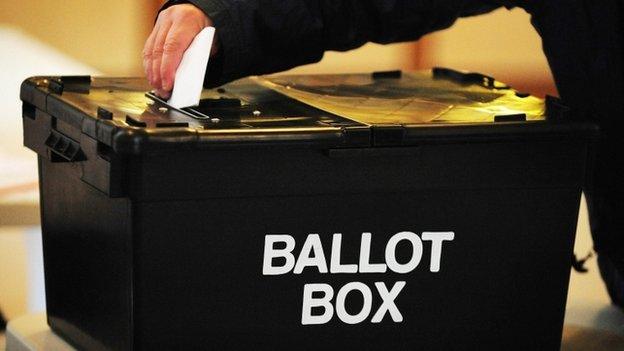BBC debate: Miliband and Sturgeon clash over post-election deal
- Published
- comments
Ed Miliband sought to distance himself from the SNP during a heated exchange
Ed Miliband has clashed with Nicola Sturgeon after she said she would only back him as PM if he rejected austerity and was "better than the Tories".
The SNP leader said she wanted a "progressive" alliance with Plaid Cymru's Leanne Wood and Green Party leader Natalie Bennett.
Mr Miliband, Labour leader, said he intended to win a majority and would not form a coalition with the SNP.
UKIP's Nigel Farage also clashed with Mr Miliband in the BBC election debate.
You can watch the full debate here.
Prime Minister David Cameron and Lib Dem Deputy Prime Minister Mr Clegg did not take part.
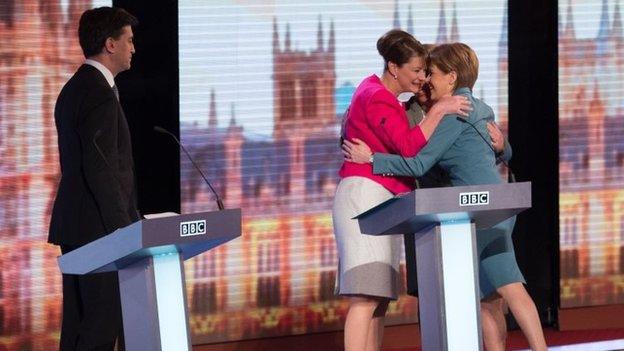
The debate finished with Mr Miliband issuing a direct challenge to Mr Cameron to take part in a debate with him, telling him: "If you believe this election is about leadership then debate me one-on-one."
The Labour leader came out on top in a snap poll. In a survey of 1,013 viewers conducted by Survation for the Daily Mirror, 35% judged Mr Miliband to be the winner, against 31% for Ms Sturgeon, 27% for Mr Farage, 5% for Ms Bennett and 2% for Ms Wood. The Scottish part of the survey sample gave the debate to Ms Sturgeon, with 68%, to Mr Miliband's 17%.
Ed Miliband to David Cameron: 'Debate me one on one'
During the 90-minute programme the Labour leader faced repeated calls from Nicola Sturgeon and Leanne Wood to reject austerity and form a "progressive" alliance with their parties and the Greens to keep the Conservatives out of government.
The two nationalist leaders and Ms Bennett said they would not prop up a Conservative government.
Ms Sturgeon claimed Mr Miliband was "so scared to be bold" that he was "not even doing the right thing by the NHS", telling the audience that "if Labour won't be bold enough on its own, I think people should vote for parties that will hold Labour to account and make them bolder".
Nicola Sturgeon, SNP: 'Labour not bold enough'
As the debate reached its climax, Mr Miliband was asked whether he would "work together" with the SNP.
He told Ms Sturgeon he had "fundamental disagreements" with her over her support for Scottish independence and ruled out a "coalition with the SNP", adding: "It's a 'no', I'm afraid."
Ms Sturgeon said this election was about "seizing an alternative to austerity," adding: "I want Labour to be bolder and deliver the change we need.
"Don't turn your back on that, Ed, and let David Cameron back into Downing Street."
Mr Miliband hit back: "You want to gamble on getting rid of a Tory government; I can guarantee that we get rid of a Tory government if you vote Labour."
He added "the difference is I have fought Tories all my life", accusing the SNP of allowing the Tories to take power in 1979 by bringing down the Labour administration of James Callaghan.
'Astonishing'
Nigel Farage set his stall out early as being against the "politically correct" consensus - but he riled the audience at London's Methodist Central Hall, saying they were remarkable, "even by the left-wing standards of the BBC".
Amid boos from the hall, host David Dimbleby said the audience had been selected by a polling company, not the corporation.
UKIP's Nigel Farage accused the BBC election debate audience of being "left-wing"
The UKIP leader then clashed with Ms Sturgeon over immigration.
"Just astonishing," said Mr Farage in response to the SNP leader's assertion that not all problems in the UK were caused by immigration.
"Yes you are," replied Ms Sturgeon.
'Real alternative'
Mr Farage also repeated his claim that the NHS was spending too much on treating foreign nationals with HIV, saying the "vast majority" of people in Britain would agree with him that the NHS should not be an "international health service".
The UKIP leader was accused by Ms Bennett of "demonising" migrants and by Ms Sturgeon of "intolerance". Mr Miliband also accused him of "exploiting people's fears".

Analysis by BBC Political Editor Nick Robinson
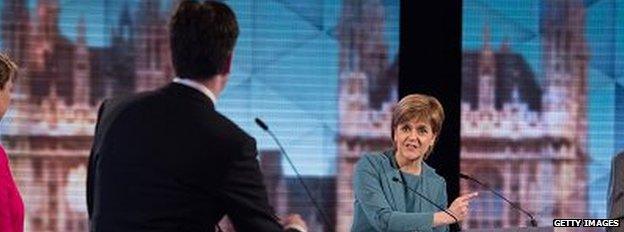
David Cameron's absence gave Mr Miliband the chance to taunt the absent prime minister for his lack of political courage.
It also allowed him to focus his fire on the SNP's Nicola Sturgeon, trying to create a distance which he has, so far, struggled to create. He rejected her repeated invitations to work together to "get rid of the Tories".
On the other hand the debate confirmed that the battle for Scotland is the defining drama of this election campaign. The images of the night, the video clips and the memorable sound bites are all of Ed v Nicola.
Conservative HQ and the Tory press will take delight in using them to conjure up the spectre of a weak minority Labour government being forced to deal with and placate a rampant SNP.

Mr Miliband then claimed Mr Farage's real agenda was to get rid of the NHS and replace it with private health insurance - which sparked a furious reaction from the UKIP leader, who accused Mr Miliband of "lying ... in front of millions of people and you keep on doing it, and lying won't win you the election".
Plaid Cymru's Leanne Wood: "Continuing on the path of austerity will deliver a very uncertain future for the next generation"
Natalie Bennett: 'Get back houses as homes not assets'
William Hague: "Any of them in any combination would be a coalition of chaos"
Lib Dem's Danny Alexander: Key issue in election is who is holding the balance of power
Plaid Cymru leader Leanne Wood challenged Mr Miliband to hold an "emergency budget" to end austerity if he becomes prime minister, but Mr Miliband did not rise to the bait, insisting Labour had plans that would help working families.
Ms Bennett also attacked Labour over austerity.
"You want to cap child benefit for two years... You want to, in a classic kind of Labour half-way house, cut university tuition fees by a third, which is better than what we've got now, but just a very modest improvement," she said.
"You also haven't committed to what extra money you're going to put into the NHS."
Earlier this month, the five party leaders - together with Mr Cameron and Mr Clegg - clashed in the first televised debate of the 2015 election. That followed a live question and answer programme in which the prime minister and Mr Miliband appeared separately.
There will also be a special Question Time on BBC One, a week before polling day, with Mr Cameron, Mr Miliband and Mr Clegg appearing separately on the programme to answer questions from a studio audience.
Mr Clegg said he had been "denied the opportunity" to speak in Friday's debate because David Cameron had not wanted to take part. Mr Cameron agreed to do one TV debate with six other party leaders, which took place last month.
It was decided that this debate would be for party leaders that were not in government, meaning Mr Clegg was not offered a place on the podium.
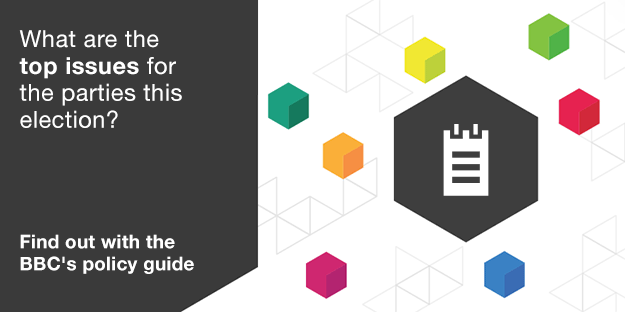
Mr Cameron said last night's debate was "part of the deal that was done to unblock the log-jam about TV debates" and he was "delighted that I played a role in unblocking that log-jam".
He said all participants in it were arguing to "abandon the plan that has turned this country around and has got us more jobs, more livelihoods and more business".
Responding to Mr Clegg's complaint, a BBC spokesman said broadcasters had worked hard to ensure "that their audiences were offered the best possible combination of programmes to help them engage with the election, to inform them about the issues and to scrutinise the politicians".
He added that the BBC was "satisfied" that its range of election programmes met the obligation to provide "due impartiality" and all relevant parties had the chance to put their case.
* Subscribe to the BBC Election 2015 newsletter to get a round-up of the day's campaign news sent to your inbox every weekday afternoon.
- Published17 April 2015
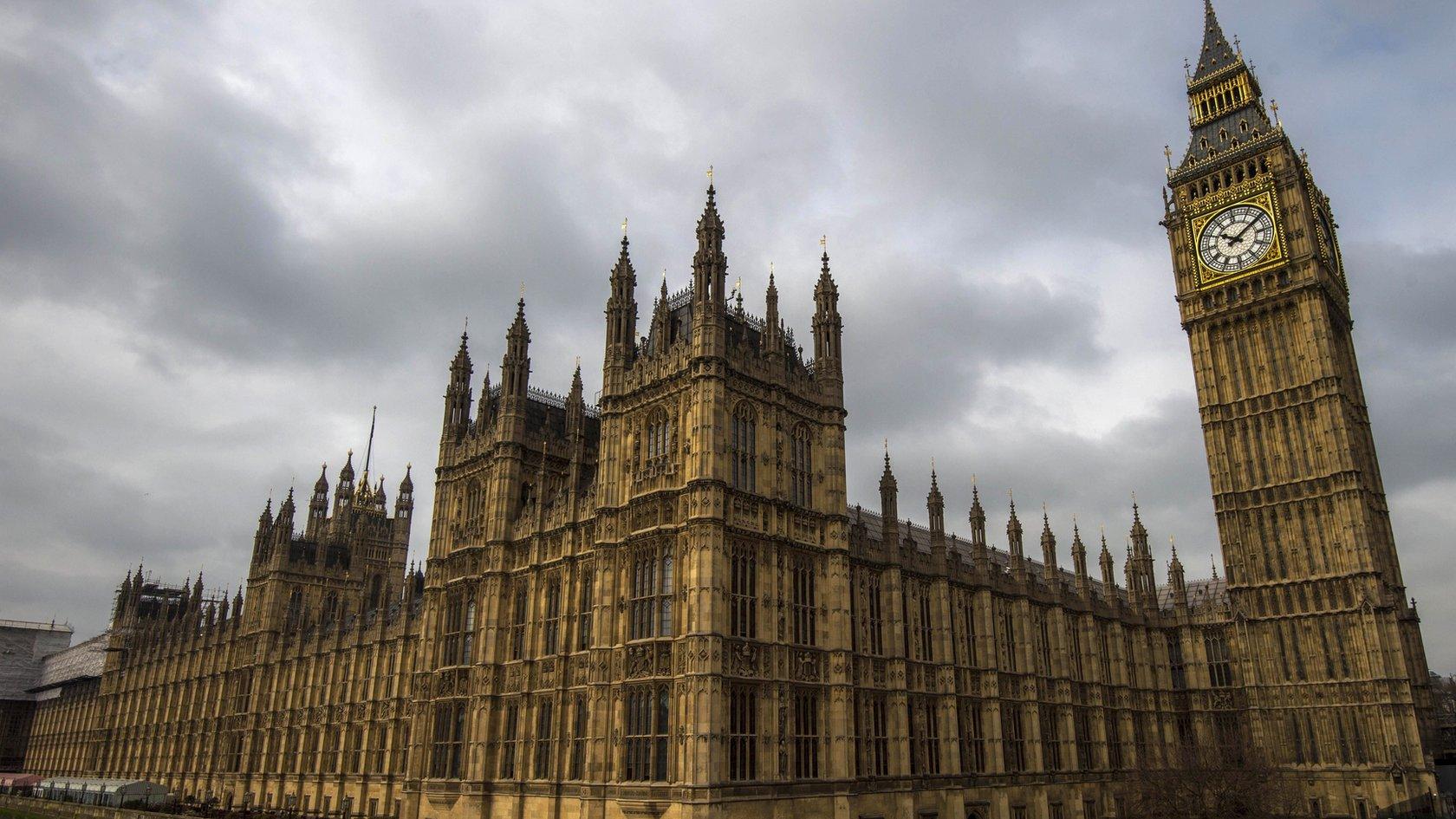
- Published16 April 2015
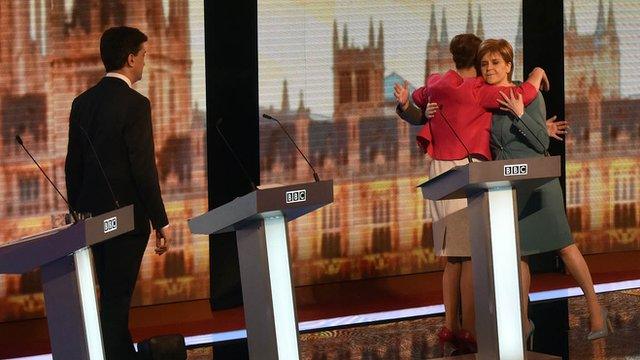
- Published15 April 2015
